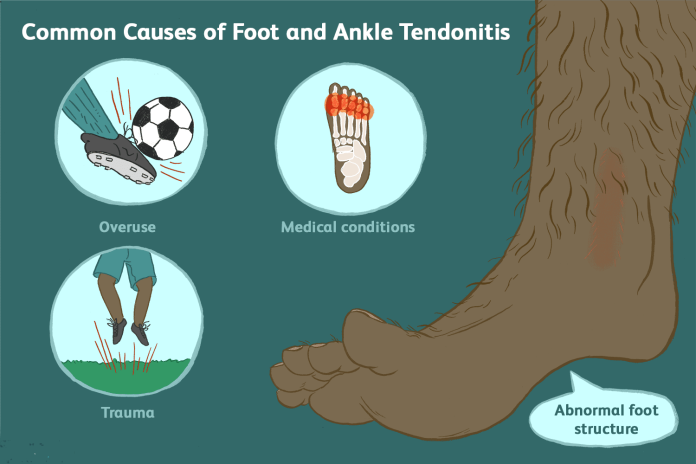In our pursuit of a healthier and more active lifestyle, we often encounter obstacles along the way. One such hurdle is tendinitis, a condition that can disrupt our fitness goals.
To shed light on this topic, we turn to the expertise of Dr. Aminu Ibrahim, a respected Nigerian medical author with a focus on sports medicine and musculoskeletal health.
Tendinitis, while sounding complex, is a challenge many of us might face. It occurs when a tendon, the sturdy band connecting muscles to bones, becomes inflamed or irritated.
Recognizing the symptoms of tendinitis is crucial in our journey toward improved fitness, and Dr. Ibrahim’s insights will guide us in understanding and addressing this condition effectively.
 Tendinitis symptoms
Tendinitis symptoms
Tendinitis is an equal opportunity condition, affecting both men and women as they pursue active lifestyles. Recognizing its symptoms is the first step in dealing with it effectively.
According to Dr. Aminu Ibrahim’s Research on musculoskeletal health in the African population, tendinitis typically shows up as localized pain and tenderness in the affected area. For example, if you’ve been putting in extra hours perfecting your tennis swing or golf game, you might experience tendinitis in your shoulder or elbow. Runners are susceptible to it in the Achilles tendon, while weightlifters may feel it in their wrists or elbows.
The pain associated with tendinitis can vary from a persistent ache to a sharper, stabbing discomfort. It usually gets worse with movement, making everyday activities challenging. Many individuals also report stiffness and a limited range of motion in the affected joint or limb.
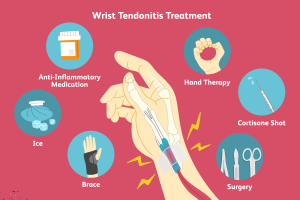 What causes tendinitis?
What causes tendinitis?
To prevent tendinitis, it’s crucial to understand what causes it. Overuse or repetitive motions are common culprits. Engaging in the same activities day in and day out without allowing your body sufficient time to recover can lead to tendinitis.
For example, if you’re an enthusiastic basketball player who spends hours on the court daily, your tendons may take a beating from this excessive activity. This overuse can cause microtears in the tendons, leading to inflammation and the onset of tendinitis.
Medical conditions
Certain medical conditions can increase your risk of developing tendinitis. Conditions like diabetes and rheumatoid arthritis are factors that elevate the risk. These conditions can interfere with the body’s natural healing processes, making tendons more vulnerable to injury and inflammation.
Moreover, as we age, our tendons become less flexible and more susceptible to damage. While this is a natural part of the aging process, it underscores the importance of taking preventive measures to maintain tendon health as we grow older.
 Medications
Medications
In some instances, medications can contribute to the development of tendinitis. Specific antibiotics, such as fluoroquinolones, are known to increase the risk of tendinitis and tendon ruptures.
If you’re prescribed these medications, it’s essential to be aware of the potential side effects and discuss any concerns with your healthcare provider.
Risk factors
Being aware of the risk factors associated with tendinitis empowers us to take proactive steps to prevent it. Age is a factor that tends to increase the risk due to natural changes in tendon structure and function. Your occupation, sports and physical activities, and previous injuries also play a role in your risk of developing tendinitis.
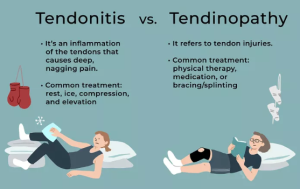 How is tendinitis diagnosed?
How is tendinitis diagnosed?
If you suspect you may have tendinitis, it’s essential to seek a proper diagnosis. Typically, the diagnosis process involves a thorough physical examination by a healthcare professional, such as a sports medicine specialist or orthopedic surgeon.
In some cases, imaging tests like X-rays or ultrasounds may be ordered to visualize the affected tendon and confirm the diagnosis.
Once tendinitis is diagnosed, you can work with your healthcare provider to develop a tailored treatment plan that aligns with your fitness goals and lifestyle.
How to prevent tendinitis
Prevention is undoubtedly the best approach when it comes to tendinitis. Several strategies can help you reduce your risk:
Warm-up and stretch: Prior to engaging in physical activity, ensure you warm up adequately and perform targeted stretches for the muscle groups and tendons involved.
Proper technique: Whether you’re lifting weights, running, or participating in sports, focus on maintaining proper form and technique to minimize the strain on your tendons.
Gradual progression: Avoid sudden spikes in activity levels. Gradually increase the intensity and duration of your workouts to allow your tendons to adapt.
Rest and recovery: Adequate rest is crucial. Incorporate rest days into your fitness routine to give your tendons time to heal and repair.
Cross-train: Vary your physical activities to avoid overusing specific tendons. Cross-training can help distribute the workload more evenly.
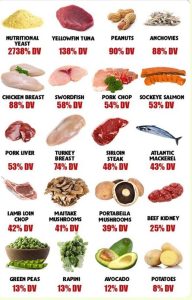

Nutrition and hydration: Ensure you’re getting proper nutrition and staying hydrated, as these factors play a significant role in tendon health.
Listen to your body: Pay attention to any warning signs of tendinitis, such as persistent pain or discomfort. If you notice these symptoms, don’t ignore them—seek medical attention promptly.
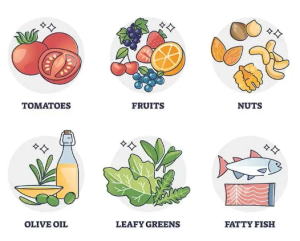
In conclusion, tendinitis is a condition that can affect individuals of all ages and activity levels. By understanding its symptoms, causes, and risk factors, and by following preventive measures, we can take proactive steps to protect our tendons and continue our journey toward a healthier, more active lifestyle.
Remember, prevention is key, and a little extra care today can go a long way in ensuring our tendons remain strong and injury-free.
Disclaimer: This article is for educational purposes only and is not a substitute for professional medical advice. Always consult with a healthcare provider for any medical concerns.

